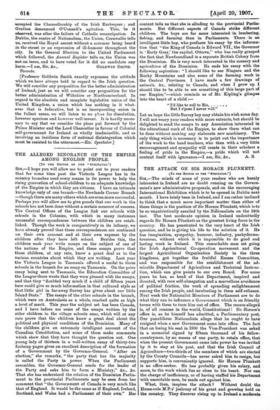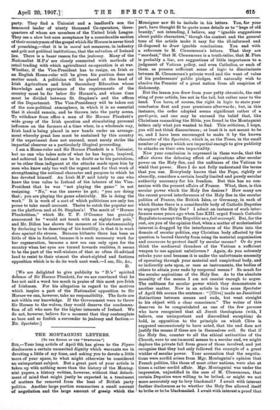THE ATTACK ON SIR HORACE PLUNK.ETT.
To vim Series oe THE " Serruxot.")
SIR,—The minds of some of your readers who are keenly interested in Ireland are no doubt running on the Govern. meat's new administrative proposals, and on the encouraging International Exhibition which is to be opened in Dublin next month. I have lately been in Ireland, and I am rather inclined to think that a much more important matter than either of these things is the position of Sir Horace Plunkett, which is to be so unpatriotically assailed by the Nationalists on the 94th inst. The best moderate opinion in Ireland undoubtedly regards Sir Horace Plunkett as the greatest living force in the country. He has penetrated to the very heart of the Irish - question, and be is giving his life to the solution of it. He has imagination, sympathy, humour, industry, pachyderms- tousness, without which it is impossible to do good and lasting work in Ireland. This remarkable man set going the Irish Agricultural Co-operation movement and the largest Agricultural Organisation Society in the three kingdoms, got together the fruitful Recess Committee, and was responsible for the establishment of the ad- mirable Department of Agriculture and Technical Instruc- tion, which can give points to our own Board. For some years he has, as head, of that Department, inspired and directed, with rare self-abnegation and a marvellous avoidance of political friction, the work of spreading enlightenment among the Irish people, and inculcating in them self-reliance. Next week the Nationalist Members of Parliament are to do what they can to influence a Government which is on friendly terms with them to turn him out of office. The reason alleged is, of all reasons in the world, Constitutional ! Sir Horace'e office is, as he himself has admitted, a Parliamentary poet: Our punctilious Nationalists allege that be ought to have resigned when a new Government came into office. The fact that on losing his seat in 1900 the Vice-President was sliced in a memorial signed by fifteen thousand of his fellow. countrymen, by no means of one party, to retain office, that when the present Government came into power he was invited by it to -stay at his post, and that the Irish Council of Agriculture—two-thirds of the members of which are elected by the County Councils—has never asked him to resign, but supports 'him, is conveniently ignored. Sir Horace Plunkett is no office-seeker. He has probably given his salary, and more, to the work which lies so close to his heart. Nor can the charge of inefficiency, or of having staffed his Department with unsuitable men, be made out against him.
What, then, inspires the attack P Without doubt the Home-rule M.P.s' jealousy of his great and growing hold on the country. They discover rising up in Ireland a moderate
party. They find a Unionist and a landlord's on the hOnoured leader of ninety thousand Co-operators, three- quarters of whom are members of the United Irish League. They see a slow but sure acceptance by a considerable section of their countrymen of the gospel which Sir Horace is never tired of preaching,—that it is in moral not measures, in industry and grit not political institutions, that the salvation of Ireland lies. There is a baser reason for the jealousy. Many of the Nationalist M.P.s' are closely connected with methods of retail trading with which agricultural co-operation is at war. Whether, if the Vice-President has to resign, an Irish or an English Home-rnler will be given his position does not matter much. A politician will be placed at the head of Irish Agriculture and Irish Secondary Education whose knowledge and experience of the requirements of the country must be far below Sir Horace's, and whose time must be divided between St. Stephen's and the offices of the Department. The Vice-Presidency will be taken out of the non-political atmosphere, in which it is so essential that it should remain, and be thrown into the party arena. To withdraw from office a man of Sir Horace Plunkett's wide grasp of the Irish question and stimulating personal influenee on the farmers at a time when, in a wholesale way, Irish land is being placed in new hands under an arrange- ment whereby great loss must be sustained by this country if the experiment does not succeed, must surely strike the impartial observer as a particularly illogical proceeding.
• I am a Home-ruler and Sir Horace Plunkett is a Unionist, but no one who takes note of what he has begun, inspired, and achieved in Ireland can be in doubt as to his patriotism, or be other than indignant at the attacks made upon him by men who know only too well the urgent need for that work of strengthening the national character and purpose to which he has devoted himself. An Irish M.P. said lately to one who knew the true value to Ireland of the labours of the Vice. Presidentthat he was "not playing the game" in not resigning. "No," was the answer he got; "you ale doing that; you are playing the game admirably. He is doing the work." It is work of a sort of which politicians are only too prone to take small account. Theirs to catch the popular ear on the platform and at St. Stephen's! The merit of "Horace Plunkettism," which Mr. T. P. O'Connor has genially announced he "would not touch with an eighty-foot pole," and Mr. Dillon has shown the measure of his statesmanship by declaring to be deserving of his hostility, is that it is work done against the stream. Because hitherto there has been so little of this in Ireland, because it is such necessary work for her regeneration, because a new era can only open for the country when her eyes are turned towards realities, it seems to be the part of the well-wishers of that so often ill-advised land to resist to their utmost the short-sighted and factions opposition which is to do its work next week.—I am, Sir, &c.,
D.
[We are delighted to give publicity to " D.'s " spirited defence of Sir Horace Plunkett, for we are convinced that he has not said a word too much in praise of this most pro-Irish of Irishmen. For his allegation in regard to the motives which inspire a part of the Nationalist opposition to Sir Horace we can, however, take no responsibility. The facts are not within our knowledge. If the Government were to throw Sir Horace to the wolves, they would deserve the condemna- tion of all who care for the higher interests of Ireland. We do not, however, believe for a moment that they contemplate so base and so foolish a surrender to jealousy and faction.— En. Spectator.)











































 Previous page
Previous page